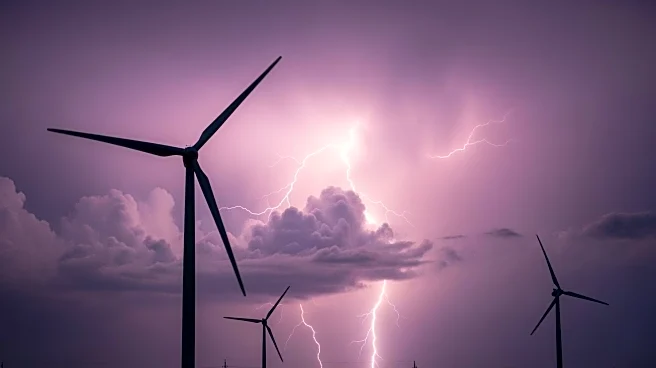What's Happening?
The Royal Meteorological Society, in collaboration with AECOM, has released a report detailing the significant impact of weather events on the UK energy sector from April 2024 to March 2025. The report identifies
key periods where weather conditions led to discrepancies between renewable energy generation and demand. Notably, in November 2024 and January 2025, cold, calm, and cloudy conditions resulted in lower-than-average wind and solar generation, leading to high energy demand and spikes in electricity prices. Despite these challenges, the UK managed to maintain energy supply through interconnections with European networks and alternative energy sources. The report also highlights the impact of seven named storms, with Storm Darragh and Storm Éowyn causing significant disruptions due to high winds and flooding.
Why It's Important?
This report underscores the growing challenges faced by the energy sector due to climate change-induced weather variability. The findings highlight the need for a resilient energy infrastructure capable of withstanding extreme weather events. The reliance on renewable energy sources like wind and solar is increasing, but the report suggests that additional energy sources are necessary to meet demand during periods of low renewable generation. This has implications for energy policy and infrastructure planning, emphasizing the importance of diversifying energy sources and enhancing grid resilience to ensure reliable energy supply.
What's Next?
The report suggests that future energy networks will need to incorporate a mix of energy sources to cope with weather-induced variability in renewable generation. This may lead to policy shifts towards investing in energy storage solutions and enhancing grid interconnections. Stakeholders in the energy sector, including policymakers and infrastructure developers, are likely to use these insights to guide future planning and investment decisions, aiming to build a more resilient and climate-ready energy system.
Beyond the Headlines
The report highlights the broader implications of climate change on energy security and economic stability. As extreme weather events become more frequent, the energy sector must adapt to mitigate risks to business and society. This adaptation may involve ethical considerations around energy equity and access, as well as legal and regulatory changes to support infrastructure resilience. The collaboration between scientific and industry experts, as demonstrated in this report, is crucial for developing evidence-based strategies to address these challenges.










